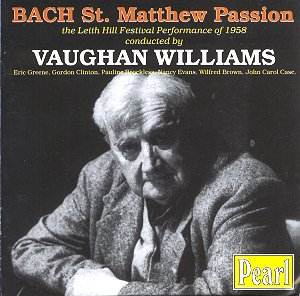It’s impossible to overstate the significance of this
recording. Taped in 1958 five months before Vaughan Williams’ death,
it preserves a performance given at that year’s Leith Hill Festival
of a work he had conducted there since 1931. The recording was made
by Christopher Finzi and Noel Taylor and is of perfectly acceptable
quality - clear, unobtrusive, not expansive but given the semi-amateur
circumstances, good. Certainly it enshrines a relatively unusual musical
occurrence – affording us the experience of hearing one composer conducting
the work of another. More than that it incarnates a performance practice
and a personal response to Bach both profoundly of its time and yet
movingly transcendent of stylistic change.
Of course there are necessary points to note. Vaughan
Williams cut a dozen numbers, including four arias; the edition used
is the Elgar-Atkins, sung in English; the keyboard continuo comprises
organ and piano; the chorus is very large. The booklet notes – comprehensive
and thoughtful, by Jerrold Northrop Moore – quote Vaughan Williams’
views on the practicalities of modern orchestral resources and their
implementation as being, in a sense, a tribute to Bach himself - as
well as outlining his rationale for the exclusion of certain numbers.
He also spoke of it being wrong to include everything for the sake of
"mechanical completeness." Other small but telling details
emerge; how Vaughan Williams insisted the audience stand for the Last
Supper Scene and, whilst his beat was imprecise, how he stared at the
musicians over the top of his glasses.
The performance itself is extraordinary. Firmly accented,
the choral singing is generally massive and slow with the recitatives
equally slow in tempo. Rallentandos abound, as do accelerandos to heighten
dramatic impulse. The result is not heaviness and ponderousness but
an organic and fiercely dramatic realisation of the meaning of the score.
And one I have to say I found intensely moving. It needs to be noted
nevertheless that the Dorking Halls’ acoustic doesn’t flatter the soloists
– clear it might be but there’s no comforting cushion around the voices.
Eric Greene is the Evangelist - textually accurate with, despite the
slowness of his recitatives, a remarkable instinct and understanding
of the music’s contours. What can’t be denied is that by this stage
of his career his voice – especially unaided by the generally unsympathetic
acoustic – was coming under very considerable strain. He is very sorely
tried at the top of his compass in Now when Jesus, as, it must
be admitted, elsewhere. Wilfred Brown employs his very distinctive musical
intelligence in his arias – listen especially to his softened tone rising
and falling in O grief! that bows and to his singing of I
would beside my Lord with the sinuous oboe line behind him.
Nancy Evans is precise in articulation of consonants in Break in
grief – attractive but not overwhelming. The choir itself is excellently
trained, sibilants precisely enunciated, reflective, reverential or
passionately involved in the drama it is itself evoking. Under Vaughan
Williams’ direction the work emerges as an intensely dramatic and fluid
one, a performance powerfully responsive to the text and to the dictates
of its internal and external meaning. It is a remarkable document and
I strongly urge you to hear it.
Jonathan Woolf


